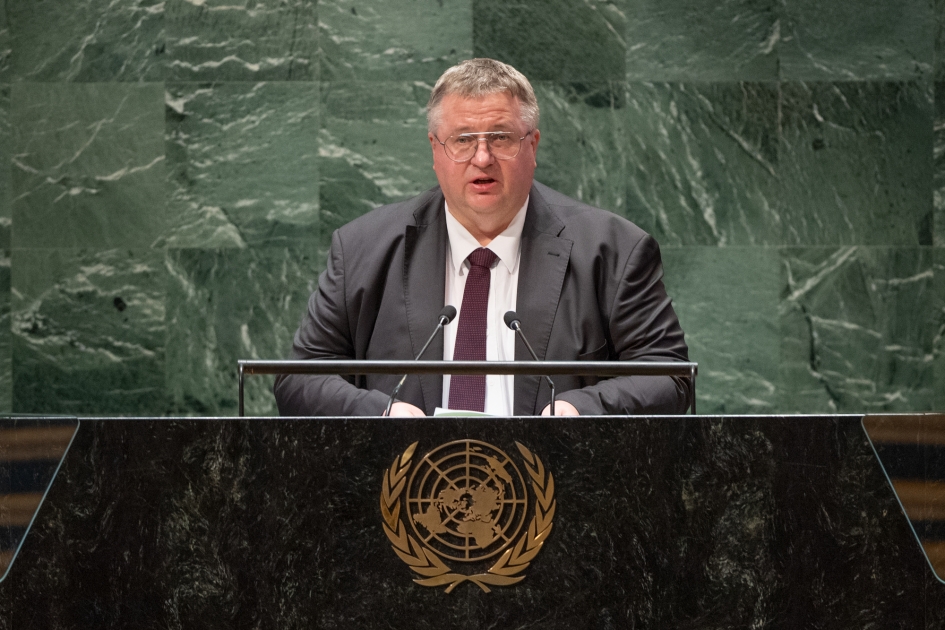Statement by Deputy Prime Minister of the Russian Federation Alexei Overchuk at the Sustainable Development Goals Summit
Today, we came together to undertake a comprehensive review of progress made in implementation of the 2030 Agenda since the previous SDG Summit in 2019. Of no less importance is the exchange of specific results related to the achievement of SDGs at fthe national level.
The most recent assessments of the UN Secretariat are deplorable. Experts note the overall slowdown in the progress and even a rollback on most SDGs against the pre-pandemic period. As developing countries are facing an increase of their external debt and its growing service costs, as well as reduction of the development assistance from traditional donors, the global SDG financing gap has reached the unprecedented level of 4.2 trillion US dollars.
The underlying causes include, in our view, miscalculations committed by the U.S. and the EU in their macroeconomic policies during the Covid-19 pandemic that spurred inflation; unbalanced energy and climate policy envisaging an accelerated green transition without taking into account the social impacts and the level of economic efficiency of decarbonization measures; as well as unwillingness of the largest donors to honor their obligations to the developing countries.
The negative impact of these factors on the global economy was further exacerbated by the policy of illegitimate unilateral sanctions against Russia that took an unprecedented scale last year.
Thus, the developing, and primarily the least developed countries fell hostage to this situation.
Despite the growing instability, it is crucial that our commitment to the 2030 Agenda remains strong and work continues at all levels – both with regards to the achievement of the SDGs as such and in terms of elimination of structural imbalances in global economy that led us to where we are today.
Notwithstanding the political and economic pressure that it is facing, Russia remains a reliable international supplier of food, fertilizers and energy resources. We are aware of the importance of these vital goods for the developing countries in Asia, Africa, Latin America and the Middle East to ensure their stable socio-economic development and improve their respective SDG indicators.
We are convinced that further advancement towards ensuring food and energy security will largely depend on the expansion and strengthening of multilateral partnerships, demonopolization of the markets for related logistic, financial and insurance services, as well as development of alternative financial settlement, insurance, transport and logistics systems.
Equally, we are active supporters of the global efforts to fight against climate change and are full-fledged participants of the international climate dialogue. In particular, we are party to the UNFCCC, the Kyoto Protocol and the Paris Agreement and are committed to their goals and objectives. Having said this, we stand for a consistent and just energy transition with due consideration for national peculiarities of the countries, as well as socio-economic effects of the climate measures.
We can only reach such equilibrium if we coordinate our efforts on the global level and in doing so ensure the balance of economic, social and environmental aspects of sustainable development.
We continue our work to implement the 2030 Agenda at the national level.
The national planning documents adopted over the recent years reflect our vector towards the achievement of the SDGs while at the same time taking into account our national peculiarities.
We keep improving the instruments for statistical monitoring of the progress in achieving the SDGs. As of now, we can apply them for over a half (116 out of 231) of global SDG indicators and continue to build up our potential.
We are working to build a national sustainable financing architecture that has already enabled us to increase the volumes of private investment in sustainable development projects in our country. As of 2022, the sustainable development sector of the Moscow Stock Exchange traded the bonds worth 298 billion rubles (over 3 billion US dollars).
We have made significant headway on the climate-related SDG 13. We have adopted the Strategy of Low-Carbon Development envisaging carbon neutrality by 2060; created the legal framework for national climate regulation; launched a regional pilot project to introduce quotas for greenhouse gas emissions and are currently developing a national system for monitoring the climate-active substances.
We are convinced that in order to see the improvement of global SDG indicators in the time remaining until 2030, we need to resume the mutually respectful dialogue between states based on the principle of sovereign equality of all members of the international community.
Russia is open for cooperation with all states seeking to build a fair global system based on the principles enshrined in the UN Charter.
In conclusion, we would like to express our concern about the situation around the Fukushima-1 NPP. We hope Japan will demonstrate maximum transparency when releasing water from the damaged NPP into the Pacific Ocean and grant the neighboring states unlimited access to any related information they might be interested in, including the possibility to take samples on the spot where the water is being released.
Thank you for your attention.
